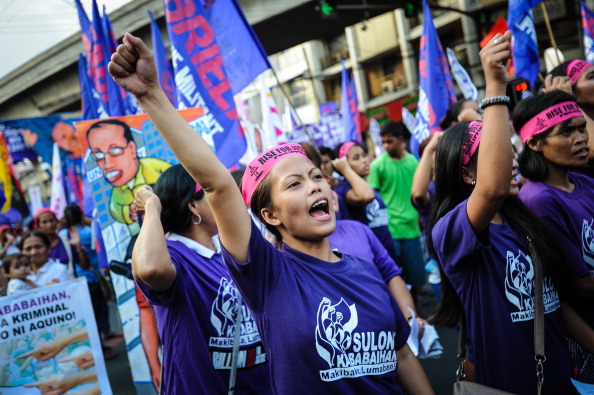By Nadine Bloch for Waging Nonviolence
If you missed celebrating International Women’s Day on March 8, don’t worry — there’s most of “Women’s History” month left to make amends. If you did celebrate it, there’s a good chance you participated in something quite unlike the original radical intentions for the day. Since 1975, when the United Nations established March 8 as the official date for International Women’s Day, it has been co-opted by corporate and state sponsorship of feel-good events — celebrating women’s achievements and inspiring actions — that cater to the political mainstream. That is, of course, only part of the story. It wasn’t always all about fun — and certainly it did not start that way.
The first International Women’s Day was celebrated in 1911 by socialists and labor activists to call for organizing rights for working women. It was followed quickly with other demands, including suffrage. Locking up so many women to slave away as garment workers in horrendous conditions in the early 20th century not only catalyzed the young women and girls into activists, but also led to organized resistance with fellow workers with whom they spent so much time. With no sick days, 16-hour shifts, a grueling pace, crowded and dirty floors, dangerous machinery, and hardly any time off, there were plenty of reasons to get mad and organize on the job!
Unfortunately for the corporations who would like you to focus only on the sanitized, pastel version of International Women’s Day, widespread actions continue to focus on the needs and conditions of women and girls worldwide. A few statistics bring it home quickly. There are more than 1 billion people in the world today who live in abject poverty — the majority of whom are women. Women are paid 20 to 40 percent less than their male counterparts around the world. Two-thirds of the children who are denied access to primary education worldwide are girls — and so women make up two-thirds of the 960 million illiterate adults globally. The UN estimates that 60 percent of chronically hungry people are women and girls. And women in sub-Saharan Africa alone spend 40 billion collective hours a year fetching fresh water. It is hard for those in the developed world to understand what a toll that takes on the rest of your life — the time you’d rather have for work, your family, or your household.
Fortunately, some actions and protests in 2014 serve to highlight the necessity and value of reclaiming the radical roots of International Women’s Day.
In Dhaka, thousands marched on Saturday as part of an ongoing campaign to protest the abhorrent garment factory working conditions in Bangladesh. They commemorated the April 2013 Rana Plaza disaster in which 1,160 people, mostly young women, died and demanded that more brands sign the legally-binding Accord on Fire and Building Safety in Bangladesh and contribute to a fund for the victims. This event evoked the Triangle Shirtwaist Factory fire protests of more than 100 years ago that catalyzed U.S. safety regulations.
Stopping violence against women was the focus of a number of events around the world, including a Guinness World Record-breaking graffiti mural in London created by over 100 female street artists associated with Femme Fierce. In Beirut, Lebanon, in support of a domestic violence bill, women marched with gut wrenching placards, including one that read “If you see it, would it finally be clear?” with a hand reaching out to choke a neck, above which there is an opening for your face surrounded by blood splatters.
Some were smaller events, but critical: Two dozen woman in Baghdad decried a draft law approved by the Iraqi cabinet that would allow the marriage of 9-year-old girls and give child custody to fathers automatically.
There were naked protests by Femen activists in Paris and New York. There were marches and rallies in hundreds of locations. Powerlifting exhibitions in Kabul, Afghanistan. Female bikers in France.
And in Gaza, there was a call for a delegation of 100 women to visit and help break the silence of the Israeli siege. The International Women’s Day delegation to Gaza came together to expose the desperate situation of Palestinian women living in an occupied territory traumatized by an economic blockade, illegal Israeli settlements, closed borders and the absence of many basic human rights. The international delegation, including Nobel Peace Laureate Mairead Maguire, was prepared to stand in solidarity with the women of the region to witness and protest these intolerable conditions — but the Egyptian border was closed and many were detained and prevented from entering the country by the Egyptian authorities.
Just in case the message wasn’t clear, Medea Benjamin, the co-founder of Code Pink, was not only jailed overnight, but her shoulder was dislocated and her arm broken before being deported to Turkey without medical care. Medea managed to keep the world aware of her mistreatment through Twitter, which did allow Code Pink’s international support network to swing into action. Even though they were badgered relentlessly, U.S. embassy officials in Cairo did not find time to check in on her. The inability of the delegation to reach the women who requested their support highlights the isolation and extreme hardships that the women and families in Gaza are facing.
International Women’s Day may have been celebrated for more than 100 years, but the world has a long way to go to provide women political, economic and social equality. Kudos to all the women and girls and their supporters who, by participating in the radical spirit of the original intention of International Women’s Day, are working towards a healthier future for all.






